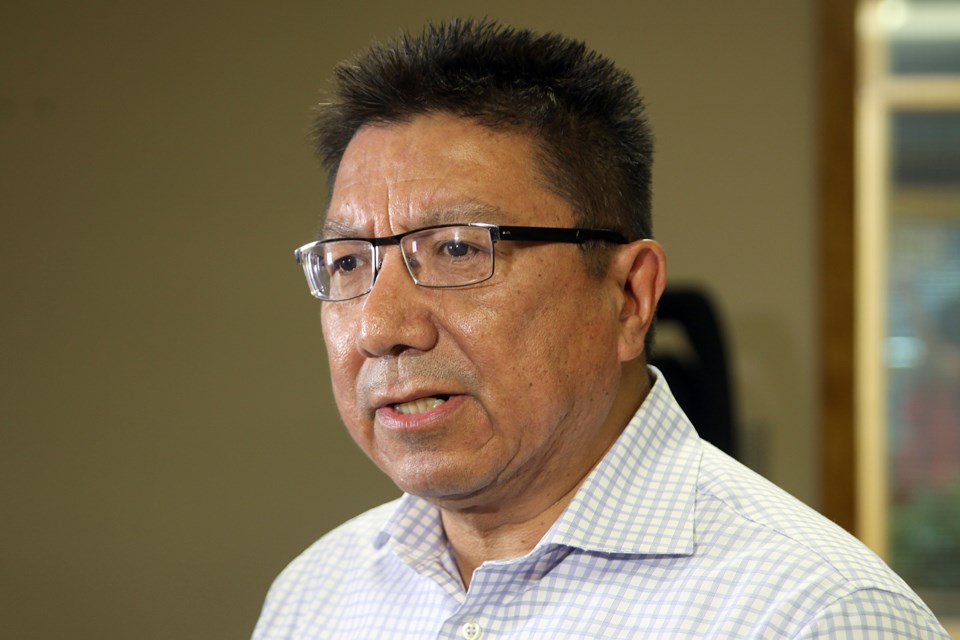THUNDER BAY - First Nation leaders are continuing to question the Thunder Bay Police Service’s handling of the recent deaths of two Indigenous youth in the city and are now calling on the RCMP to take over the investigation.
In a media conference held in Toronto on Wednesday, Nishnawbe Aski Nation Grand Chief Alvin Fiddler, Grand Council Treaty #3 Ogichida Francis Kavanaugh, and Rainy River First Nations Chief Jim Leonard called on the RCMP to take over the investigation into the deaths of 17-year-old Tammy Keeash and14-year-old Josiah Begg, who were found dead in area waterways this month, and the 2015 death of Stacy DeBungee.
“Today we are here to demand some action immediately,” Leonard said. “The Thunder Bay Police I don’t think is an option.”
Leonard said First Nations leaders have encountered roadblock after roadblock when trying to get answers into the deaths of Indigenous youth in the city of Thunder Bay.
“It’s our view that the Thunder Bay police cannot fix this,” he said. “They have shown that they are not able to come to any conclusion other than the deaths are non-suspicious and non-criminal, which doesn’t hold any water with us.”
According to Kavanaugh, requests were made to Thunder Bay Police last year to have the case of Stacy DeBungee investigated by another police force after family members questioned Thunder Bay Police’s determination that his death was not suspicious.
The Ontario Provincial Police refused to head an independent investigation into DeBungee’s death because of the ongoing Office of the Independent Police Review Director review of the Thunder Bay Police, so Kavanuagh said bringing in the RCMP is the next logical step.
“The police force for Canada is currently free of any involvement in Northern Ontario,” Kavanaugh said. “The RCMP is the best investigative agency to complete these investigations and provide a credible report. There is both precedent and legal authority to bring the RCMP where local police service is unable or unwilling to provide unbiased services itself.”
The chiefs are also calling on the Ontario Civilian Police Commission to launch an inquiry and appoint an administrator to investigate the Thunder Bay Police Services Board.
“There has been no leadership at all in our view from this police services board,” Fiddler said. “Over these many years, over the many tragic events and the losses our communities have suffered, they have been silent.”
“It just reinforced what we’ve been saying all along, that they do not represent us, even though Thunder Bay has a growing Indigenous population,” Fiddler said. “Rather than acknowledging what is happening in our community, they continue to deny that there are issues that they need to resolve.”
A statement from the Police Services Board said the board is not permitted to take action or provide direct supervision with the day-to-day operation of the police service.
“This board accepts that systemic racism is a barrier to the Indigenous peoples,” the statement continued. “Systemic racism is a much broader term than just the relationships between police and Indigenous communities. A police service cannot cure systemic racism. We accept that our service has a role to play.”
In a letter from the Ontario Civilian Police Commission, executive chair Linda Lamoureux said an investigation has been launched into the manner in which the Police Services Board provides oversight to the Thunder Bay Police Service.
“At this time, the commission requires evidence from its investigation before considering the appointment of an administrator,” the letter stated. “Should our investigation provide such evidence, the commission will not hesitate to act accordingly.”
Thunder Bay Police Service Board vice-president Brian McKinnon said he welcomes the investigation by the OCPC.
“We have spoken about it, we have talked to as many individuals as we can and we welcome it,” McKinnon said. “We will co-operate and I will say that without equivocation, and we will do whatever we can to solve whatever issues there are out there.”
According to Leonard, attempts to contact the police services board in the past have been met with more barriers, but McKinnon said that is not the case.
“They can use whatever words they want, all I can do is say that has not been the case from us,” he said. “Whatever we have been asked for and been legitimately able to reply to, we’ve done it.”
In 2016, Leonard and the Band Council of Rainy River First Nation sent three letters to the Thunder Bay Police Services Board requesting an opportunity to make a deputation on the relationship between Aboriginal people and the Thunder Bay Police Service, as well as public dialogue around the OIPRD review of the police force.
A reply was sent on Dec. 15, 2016 by chair of the Thunder Bay Police Service Board, Jacqueline Dojack.
“Regrettably, since the matter which Chief Leonard wishes to address the Board is the review of the Thunder Bay Police Service by the Office of the Independent Police Review Director, it would be inappropriate to engage in dialogue at this time as the review is still ongoing,” the letter states.
A letter from the First Nations leaders was also sent to the Minister of Community Safety, but no response from the federal government or the RCMP has been received yet.
Leonard said First Nations leaders and community members said they just want answers because too many of their youth have been found dead in Thunder Bay Rivers.
“That’s why we are here, to ask for help from the RCMP, to help us find out what is happening, because obviously something is happening there,” he said.
Thunder Bay Police were not immediately available for comment.
